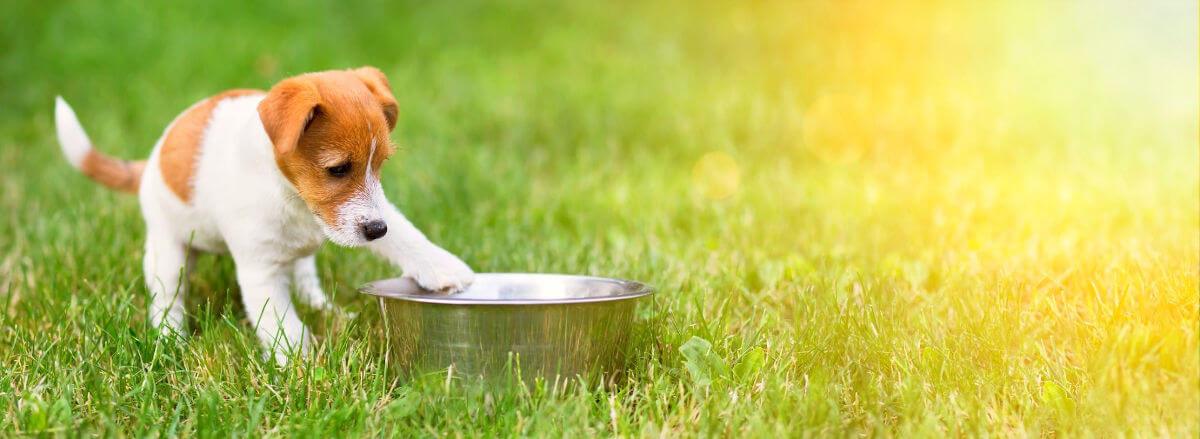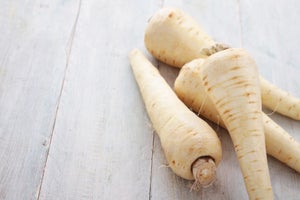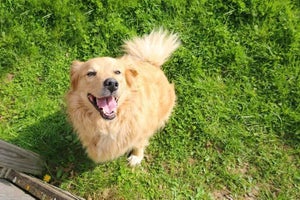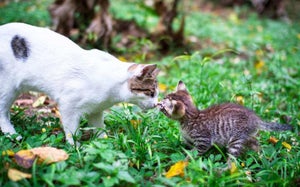
When a dog rests their head on your lap and looks up at you longingly, it can be tempting to treat them with a little titbit from your dinner. This may seem like a harmless act of kindness to brighten your dog’s day; but this impulse should be resisted. Like humans, dogs are omnivores, but their digestive system is very different from ours and a carefully regulated diet is needed to maintain their health.
Here, James Wellbeloved looks at what dogs can and can’t eat, so you can keep your pooch healthy. This guide will also explore the unique dietary requirements of puppies.
WHAT CAN DOGS EAT?
Dogs should be fed a regular diet of specially formulated dog food. Feeds like those offered by James Wellbeloved offer all the nutrition your dog requires to be happy, healthy and full of energy. However, it is understandable that many owners want to treat their pets occasionally. If you are going to feed your dog treats, you should choose them carefully. So that you are not overfeeding your dog, ensure that you take out a portion of their daily food allowance when giving these treats; the treats should account for no more than 10% of their diet
Generally, you should not give your dog human foods, as there are specially created dog treats that are better for them. If you decide you do want to feed your dog human food occasionally, the least harmful options are:
lean cuts of meat
some fruit, except for grapes and raisins
vegetables such as carrots or brocolli
short-life fish, like salmon
WHAT CAN DOGS NOT EAT?
Dogs’ digestive systems work differently to humans’, which means there are numerous foods we love that they can’t have. Toxic foods you should not feed your dog include:
Grapes and dried fruits
Foods from the Allium family (onion, garlic, leeks and chives)
Chocolate
Macademia nuts
Xylitol (a sweetener found in foods like chewing gum and sweets)
You should also be careful to avoid feeding your pooch dairy products such as cheese or cream. These foods are high in fat and bad for your dog. They also contain a sugar called lactose, which can cause digestive issues for your pet, as they lack the enzyme required to break it down.
WHAT SHOULD A PUPPY EAT?
Puppies are generally weaned off their mum’s milk and onto solid food by eight weeks. A responsible breeder will not sell a pup until this has happened and you should not buy from them if they attempt to.
The breeder should provide you with a few days of puppy food, as a sudden change to a new brand or type of food can cause digestive issues for puppies. If you are changing brand, do this gradually over a period of a week to provide a gentle transition for your pup. Start by replacing a small amount of the old food with the new food and slowly increase the ratio of new food to old over several days, until your puppy is happily eating whole portions of the new food.
HOW OFTEN SHOULD A PUPPY EAT?
You should give your puppy three to four small meals a day until they are around four months old. You can start to reduce the food as they get older. This will depend on the size/breed of your dog. Always ask a vet if you are unsure how much to give them.
Space these meals out evenly throughout the day and feed your puppy at the same times if possible. Routine and consistency are key for training your dog.
That concludes James Wellbeloved’s guide to feeding your pet pooch. Remember to consult a vet if you are intending to make any changes to your dog’s diet. They will be able to provide professional advice, specially tailored to your pet’s needs.

Related Articles








